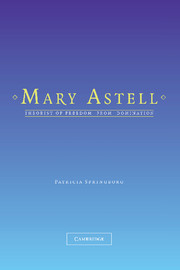Book contents
- Frontmatter
- Contents
- Acknowledgements
- Mary Astell, a Brief Chronology
- Introduction: Astell and Early Modern Feminism
- 1 Mary Astell, Philosopher, Theologian and Polemicist
- 2 Astell, Drake, Education, Epistemology and the Serious Proposal
- 3 Astell on Marriage, Patriarchalism and Contractarianism
- 4 Mary Astell and the Settlement of 1689
- 5 A Fair Way with the Dissenters and Their Patrons
- 6 Astell, Locke and the Highway Man: A Test Case
- 7 Astell, Drake and the Historical Legacy of Freedom
- Appendix: Glossary and Select Biographical Notes
- Notes
- Select Bibliography
- Index
7 - Astell, Drake and the Historical Legacy of Freedom
Published online by Cambridge University Press: 07 September 2009
- Frontmatter
- Contents
- Acknowledgements
- Mary Astell, a Brief Chronology
- Introduction: Astell and Early Modern Feminism
- 1 Mary Astell, Philosopher, Theologian and Polemicist
- 2 Astell, Drake, Education, Epistemology and the Serious Proposal
- 3 Astell on Marriage, Patriarchalism and Contractarianism
- 4 Mary Astell and the Settlement of 1689
- 5 A Fair Way with the Dissenters and Their Patrons
- 6 Astell, Locke and the Highway Man: A Test Case
- 7 Astell, Drake and the Historical Legacy of Freedom
- Appendix: Glossary and Select Biographical Notes
- Notes
- Select Bibliography
- Index
Summary
Freedom from Domination in the Civil Law and Natural Rights Traditions
Mary Astell had an overwhelming concern to persuade general citizens of the sanity of Tory arguments and the dangers to the public interest of theories of social contract and resistance, theories that had ever gained but limited advocacy. But new ideas were abroad unsettling to old Tory views, and it is a mark of the complexity of Astell's thought that she reflects these tendencies also. Whig arguments for specified freedoms – particularly religious toleration – to be constitutionally protected reflected the inroads made in the second half of the seventeenth century by doctrines of natural right. To this Continental legal tradition belonged the great European natural rights theorists, Hugo Grotius and Samuel Pufendorf (1632–94), the former of whom Astell cites, along with their English counterparts, Hobbes and Locke, whose periods spent in Europe had brought them within the orbit of the civil law tradition. Rights discourse intruded into an environment of fairly parochial English argument about the legitimacy of monarchy, where case and counter-case were typically argued in terms of British history, the ancient constitution, whether king or Parliament was the true repository of immemorial custom, claims made for English common law as a fund of equity and justice, and on behalf of the lawyer practitioners who articulated it. But it would oversimplify the position to argue that the English legal tradition had been parochial for long.
- Type
- Chapter
- Information
- Mary AstellTheorist of Freedom from Domination, pp. 209 - 238Publisher: Cambridge University PressPrint publication year: 2005



